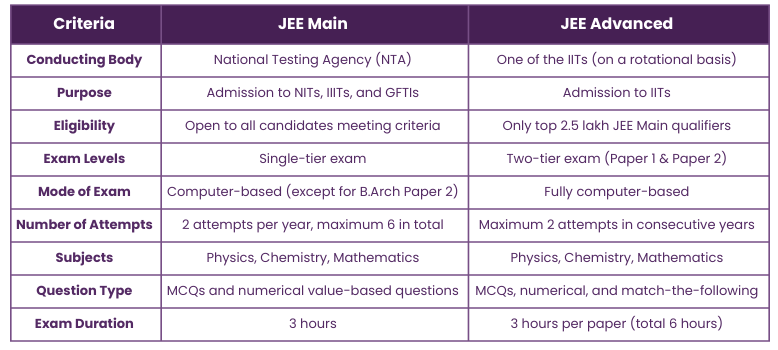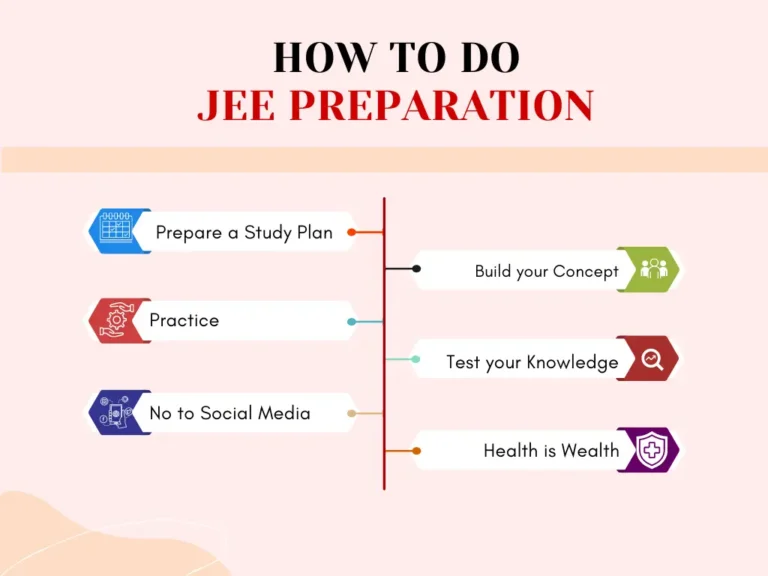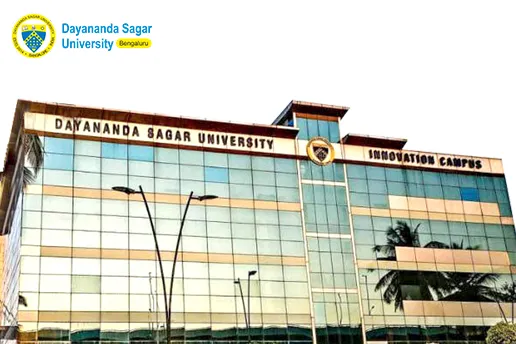JEE Mains vs Advanced: Key Differences & Pattern
Table of Contents

The JEE, which stands for the Joint Entrance Examination, is considered to be one of the toughest and most inspiring exams to crack in India. It not only gives opportunities to students to study in the finest engineering colleges but also helps with the world-class pedagogy and exposure to build their character.
But there are many engineers who are often confused about these two critical phases of the exam, i.e., JEE Mains vs Advanced. Understanding the differences regarding patterns, syllabus, and eligibility can help students prepare accordingly for such competitive exams in 2026. So, in this comprehensive blog, let’s give you an idea about the difference between JEE Mains vs Advanced and how to prepare for them.
What is JEE Mains?
The first question that comes from many students is, “Is JEE Main enough for IIT?” Well, the answer is “NO”. Before jumping to the differences between JEE Mains vs Advanced, let’s understand what JEE Main is in a clear way.
JEE Mains – the first stage of the JEE examination, which is organised by the NTA(National Testing Agency), serves as the qualifying exam for JEE Advanced. It is also an entrance test for admission to prestigious colleges like NITs, IITs, and many other centrally funded technical institutions.
Moreover, IIT JEE Main 2026 will be covering different papers based on the course students wish to pursue:
- IIT JEE Main 2026 Paper 1: For students aiming for B.Tech/BE courses. This paper will have 75 multiple-choice questions (MCQs), with a total of 300 marks.
- IIT JEE Main 2026 Paper 2: For students interested in BArch or BPlan courses:
- Paper 2A: For BArch aspirants, this paper will have 77 questions, carrying a total of 400 marks. The drawing section will be held offline.
- Paper 2B: For BPlan aspirants, this paper will consist of 100 MCQs, totalling 400 marks, and will be conducted entirely online.
This entrance exam tests basic understanding and quick problem-solving ability, which is an essential step before progressing to the JEE Mains vs Advanced challenge.
What is JEE Advanced?

*theknowledgeacademy.com
JEE Advanced is the second phase of the JEE exam, conducted annually by one of the IITs on a rotational basis. It determines admission to the Indian Institutes of Technology (IITs) and a few other premier research institutions, such as IISc and IISERs.
Unlike JEE Main, which is predictable and objective in pattern, JEE Advanced questions often require multi-layered thinking. The JEE Mains vs Advanced comparison highlights that while Mains focuses on fundamentals, Advanced emphasises analytical depth and conceptual integration.
Paper Types:
- Two compulsory papers (Paper 1 and Paper 2), each of 3 hours.
- Total Marks: Varies each year, with the marking scheme often including full, partial, and negative marking.
FYI: A good performance in JEE Advanced secures admission to IITs and opens doors to other reputed institutions like IISc and IISERs.
JEE Mains Vs Advanced: Understanding the Differences
Here’s a detailed overview to help you understand the differences between JEE Advanced vs JEE Mains in terms of structure, purpose, approach, and much more.
| Aspect/Parameter | JEE Main | JEE Advanced |
|---|---|---|
| Purpose / Gate | Entrance for NITs, IIITs, CFTIs; qualifying test for JEE Advanced | Entrance to IITs; final competitive exam for elite engineering spots |
| Number of Papers | 1 (B.Tech/BE) + 2 (B.Arch / B.Plan) | 2 papers (compulsory for all) |
| Mode / Medium | Computer-based (online), except drawing offline in B.Arch | Usually computer-based, but depends on IIT conducting body |
| Question Types | MCQ + numerical value type questions | MCQ, integer, matrix-match, comprehension, multi-part, etc. |
| Total Marks/Difficulty | Paper 1: 300 marks; Paper 2: 400 marks | Varies yearly; often higher complexity, weights, and partial scoring |
| Negative / Partial Marking | –1 for MCQ wrong, no negative for numerical type | Negative/partial marking depending on question structure |
| Eligibility/Qualification | Class 12 or appearing, no age limit (as per the latest) | Must be among the top ~2,50,000 in JEE Main; age & attempt constraints |
| Number of Attempts | Up to 3 attempts (not necessarily consecutive) | Maximum 2 attempts in consecutive years |
| Age Limit | None (currently) | General: born on/after Oct 1, 2001 (or 2000 per some sources) with a 5-year relaxation for SC/ST/PwD |
| Class 12 / Board % Criterion | No 75% requirement to appear | No board % to appear (since 2023), but for admission into IITs, 75% in board (or top 20 percentile) may be required |
| Selection / Cutoff | Cutoff for appearance in Advanced, and for admissions to NITs, etc. | Cutoff for IIT admission based on the Advanced rank & category-wise criteria |
| Flexibility/Predictability | Pattern relatively stable, moderate difficulty | Pattern can vary, more surprises, greater difficulty jump |
Eligibility & Attempt Rules (2026 Changes)
1. Top 2,50,000 Rule
According to official updates, candidates appearing for JEE Mains vs JEE Advanced 2026 must note:
- To appear in JEE Advanced 2026, a candidate must rank in the top 2,50,000 (across all categories) in the JEE Main Paper 1 (B.Tech) merit list.
- The selection is category-wise, with horizontal reservation for PwD candidates.
2. Board Exam / Class 12 Criteria
- For JEE Advanced 2026, there is no mandatory minimum board percentage to qualify. The previous rule (75% in boards / top 20 percentile) has been waived as per policy changes from 2023 onwards.
- However, to get admission into IITs, in many cases, the candidate must meet the board criteria (75% or top 20 percentile); failing to do so may disqualify even a qualified advanced candidate.
3. Age and Attempts
- At present, up to 2 attempts in consecutive years are allowed for JEE Advanced.
- Some sources state a special provision: a third attempt may be permitted for candidates who dropped between certain dates (Nov 5–18, 2026), though this is subject to final confirmation.
- Age limit: Many sources for 2026 mention that general category candidates must be born on or after October 1, 2001; for SC/ST/PwD, born on or after October 1, 1996 (i.e., 5-year relaxation).
- Some older sources still mention Oct 1, 2000, as a cut-off, these discrepancies reflect changing policy drafts.
Pattern & Difficulty Gap
The biggest difference in JEE Mains vs Advanced lies in question quality and conceptual integration.
- The level of difficulty from Mains to Advanced increases substantially. Whereas JEE Main is about checking conceptual clarity and speed and is based on a standard syllabus, JEE Advanced not only checks your deep conceptual understanding of the subject but also your ability to integrate and relate content across topics, reason through multi-step problems, and use creativity in problem-solving.
- In Advanced, the questions can weigh more than one subject and use a blend of integrated concepts (ex,. Physics + Math integration), have multiple steps within the question and/or require experimental reasoning, or comprehension of the information provided in the standard situation.
How to Approach Preparation: Mains & Advanced

*isharpacademy.in
Balancing JEE mains vs advanced preparation requires a strong strategy:
- Make Your Base Stronger: In JEE Main, focus on having clear foundations; JEE Advanced requires you to extend those foundations to even harder limits. First, focus on mastering the foundations.
- Focus on Variety & Depth of Problems: For Advanced, practice problems from different resources (IIT past papers, advanced problem collections). Focus on multi-step and non-routine problems.
- Time Management & Accuracy: As you move to JEE Advanced, accuracy is even more important. Thus, avoid any careless mistakes. Practice under timed conditions; practice reading for 3 hours under exam conditions.
- Practice Exams & Analytics: Practice full-length exams (both Mains-like and Advanced-like), analyse weaker areas, and return to foundations.
- Closing the Gap: After taking JEE Main or as JEE Main approaches, gradually begin dipping into the Advanced-level problems. Take it in phases.
- Board Exam Plan (if relevant): The most important thing about JEE Main vs JEE Advanced is that, while JEE Main no longer has board percentage applied (for many forms of admission), board exam performance is still considered when applying for admission in many cases.
The Bottom Line
To prepare for JEE Mains vs Advanced, students need more than intelligence. Available concepts need to be practised appropriately with the right strategy and peace of mind. While JEE Main seeks to establish the general pace of conceptual clarity and speed, JEE Advanced seeks to evaluate how conceptually applied the subjects are in rigorous problem-solving, pretty much outside the textbook. As the exam date, 2026, gets nearer, students should also concentrate on resonance with the basic fundamentals of the subjects, specifically practising questions diversely, and we always want them to keep abreast of the latest developments in eligibility and pattern changes, specifically from NTA and IITs.
Always remember, success is not only about problem-solving experience but also about a consistent pace and development with consistency and a robust discipline and problem-solving culture. If you are seeking career counsel and experienced academic advisors on your next big engineering step, the team at Jaro Education can assist you all the way in planning and guidance.
We comprise highly skilled career counselors and experienced academic advisors dedicated to assisting you in planning and guiding your next significant engineering endeavor.
Frequently Asked Questions
Who is eligible to appear for JEE Advanced 2026?
Only the top 2,50,000 candidates from all categories in JEE Main Paper 1 (B.Tech) are eligible.
Can I get admission in IITs through JEE Main only?
No. IIT admission will only be based on the JEE Advanced score and ranking. For NITs, IIITs and GFTIs, JEE Main scores will be used for admission.
How many attempts can a student take for JEE Main and JEE Advanced?
When talking about JEE Main vs JEE Advanced, students can attempt JEE Main three times – in consecutive years – and JEE Advanced two times in consecutive years.
Is there a 75% board marks requirement for JEE 2026?
To take JEE Main or Advanced, there is no minimum percentage in board exams required. However, for admission into IITs, candidates must obtain 75% in their Class 12 board exams (or be in the top 20 percentile).
















